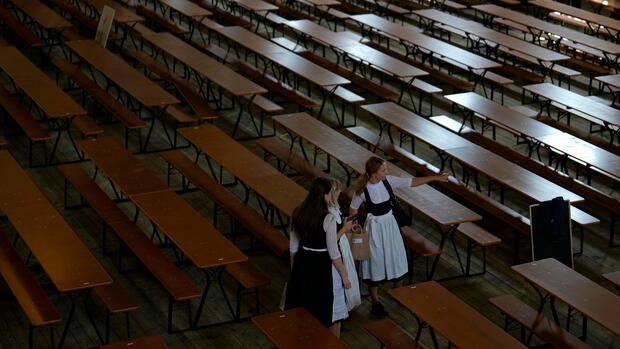After a rainy restart after the Corona break, Oktoberfest wants to build on previous visitor numbers this year with better weather.
(Photo: AP)
Munich Munich is hoping for a successful 188th Oktoberfest despite the economic downturn and price increases. “We are not chasing records,” said Wiesn boss Clemens Baumgärtner to the Handelsblatt. But this year’s Oktoberfest will certainly be well attended, also because the largest folk festival in the world is running two days longer this time: from next Saturday to October 3rd, in order to take the holiday with it – at 18 days, two days longer than usual.
Also because of the significantly better weather forecast, the number of visitors, at least in the first week, is likely to be higher than in 2022. Last year, after a two-year Corona break in cold, wet weather, only 5.7 million visitors came to the festival site. A rather mediocre result; in 2019 there were still 6.3 million. Beer consumption also fell from 7.3 to 5.6 million liters. Because of the bad weather, hardly any guests could be served in the outdoor beer gardens in 2022.
The Oktoberfest brings the city, its innkeepers and showmen more than a billion euros in annual sales. According to a survey by the economic department, the approximately 6.3 million visitors to the 2019 Oktoberfest spent an average of 71 euros per person directly on the festival grounds, a total of almost half a billion euros. Food, shopping in the city and taxi rides cost the foreign visitors a total of around 290 million euros. In addition, there was a good 500 million euros for accommodation and catering.
“This contributes to the city’s sympathy”
But the indirect effects are just as important, says Wiesn boss Baumgärtner (CSU), who organizes the festival as the city of Munich’s labor and economic representative: “This contributes to the city’s sympathy, the aura is completely different thanks to Oktoberfest.” In addition, tourists all over the world would see that Munich is safe – even if six million visitors come to the city.
Beer at Oktoberfest will again be significantly more expensive in 2023 than last year. The cheapest price is 12.60 euros in the museum tent at the historic “Oiden Wiesn”. In the Käfer-Wiesn-Schänke, on the other hand, 14.50 euros are due. According to the city, prices rose on average by a good six percent. A liter of table water now costs around ten euros.
Attending the Oktoberfest is “something you can afford,” says the Oktoberfest boss.
(Photo: AP)
Wiesn boss Baumgärtner does not believe that the general price increases and the weak economy will dampen consumer sentiment. Anyone who eats and drinks something at the Oktoberfest only pays ten to 20 percent more than if they go to a normal pub in the city. Attending Oktoberfest is “something you can afford.”
Six Munich breweries are allowed to serve
The city reviews beer prices every year to ensure they are reasonable. The large catering establishments in Munich serve as a comparison. Here the liter currently costs 7.10 to 12.20 euros. Special Oktoberfest beers from the six major Munich breweries Augustiner, Hacker-Pschorr, Löwenbräu, Paulaner, Spaten and Staatliches Hofbräuhaus are served in the 17 festival tents with a total of around 120,000 seats.
Oktoberfest “is every restaurateur’s dream”
New to the Oktoberfest this year is Christoph Link with his circus café. “This is every restaurateur’s dream,” he says. The innkeeper from Vaterstetten had a circus wagon converted during the Corona period so that guests could keep their distance, and has now successfully applied for the Oktoberfest. He also believes that consumer sentiment will be good: “People want to get out again.” In the end, however, a lot will depend on the weather. In any case, the forecasts are good for the start of the weekend.
For the first time this year, the Paulaner festival tent only serves organic chicken. The “Faire Wiesn” initiative had called for only organic food to be offered at Oktoberfest by 2025, if the city wants to be climate neutral. All major events on urban land should “become lighthouse projects for true sustainability”.
The Bavarian Hotel and Restaurant Association Dehoga Bayern rejected the demand. “It is simply unrealistic to even get this amount of goods in the required quality,” said state managing director Thomas Geppert. In his opinion, a visit to the Oktoberfest would then be unaffordable for most people.
This year, 474 businesses are admitted to the festival, including 140 from the catering industry and about the same number of showmen. There is a new addition to the rides this year: “Mr. Gravity”, ten gondolas rotate on a disc, reaching speeds of up to 100 kilometers per hour during the journey.
More: Gastronomy is booming again in big cities
